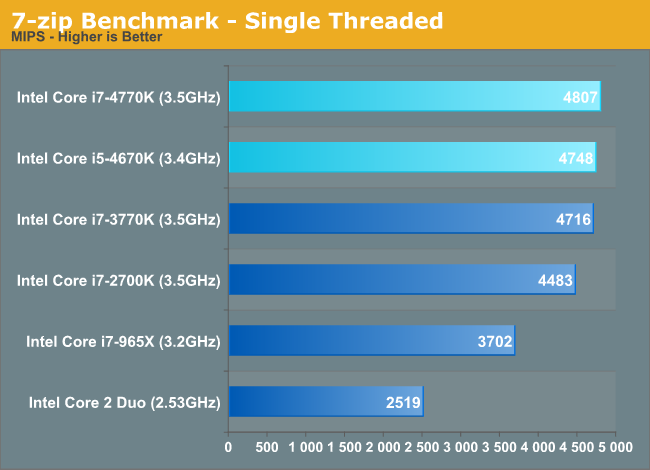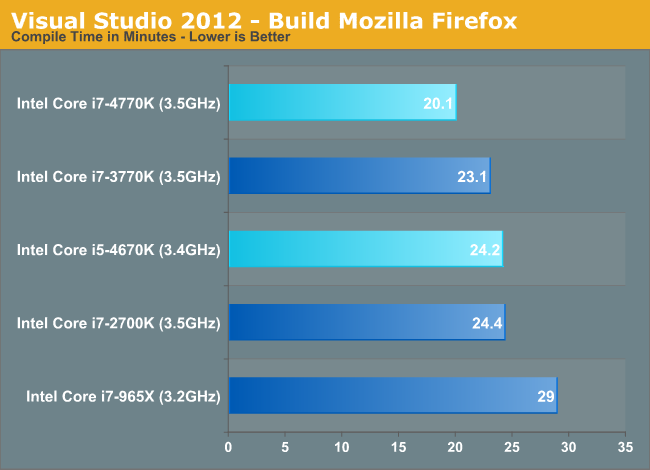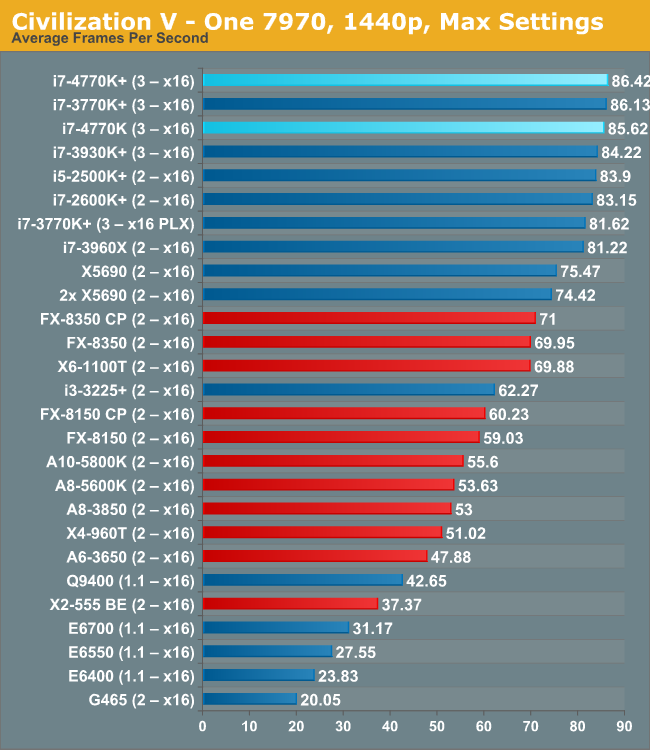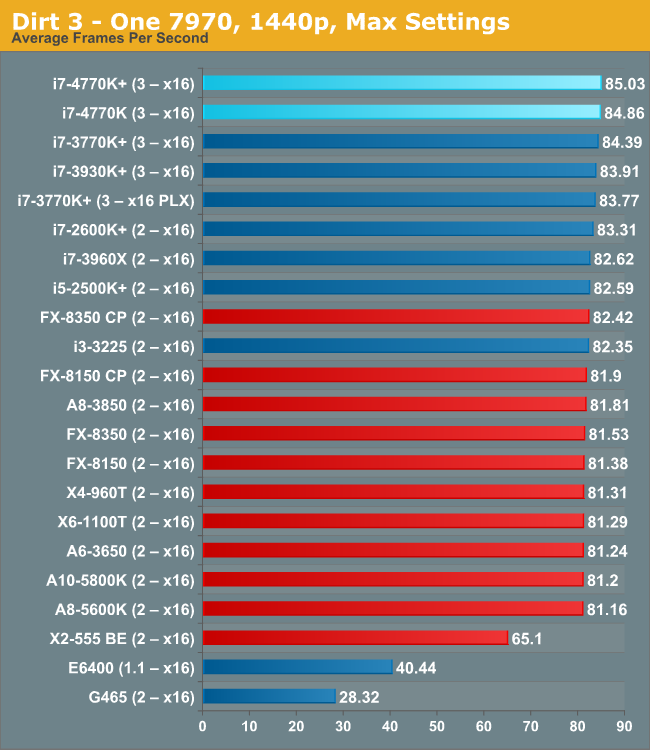The Haswell Review: Intel Core i7-4770K & i5-4670K Tested
by Anand Lal Shimpi on June 1, 2013 10:00 AM ESTCPU Performance: Five Generations of Intel CPUs Compared
For the purposes of our look at Haswell, we will be breaking up our review coverage into two parts. The rest of this article will focus on the CPU side of Haswell, while coverage of the GPU - including Iris Pro and Crystalwell - has been spun off into another artice: Intel Iris Pro 5200 Graphics Review: Core i7-4950HQ Tested.
The majority of the market doesn’t upgrade annually, so I went back a total of five generations to characterize Haswell’s CPU performance. Everything from a 2.53GHz Core 2 Duo through Nehalem, Sandy Bridge, Ivy Bridge and Haswell are represented here. With the exception of the Core 2 platform, everything else is running at or near the peak launch frequency for the chip.
In general, I saw performance gains over Ivy Bridge of 1 - 19%, with an average improvement of 8.3%. Some of the performance gains were actually quite impressive. The 7.8% increase in Kraken shows there’s still room for improvement in lightly threaded performance, while the double digit FP performance gains in POV-Ray and x264 HD really play to Haswell’s strengths.
Compared to Sandy Bridge, Haswell looks even more impressive. The Core i7-4770K outperforms the i7-2700K by 7 - 26%, with an average performance advantage of 17%. The gains over Sandy Bridge aren’t large enough to make upgrading from a Sandy Bridge i7 to a Haswell i5 worthwhile though, as you still give up a lot if you go from 8 to 4 threads on a quad-core part running heavily threaded workloads.
Compared to Nehalem the gains average almost 44%.











Quite possibly the most surprising was just how consistent (and large) the performance improvements were in our Visual Studio 2012 compile test. With a 15% increase in performance vs. Ivy Bridge at the same frequencies, what we’re looking at here is the perfect example of Haswell’s IPC increases manifesting in a real-world benchmark.
Gaming Performance
After spending far too much time on the Iris Pro test system, I didn’t have a ton of time left over to do a lot of gaming performance testing with Haswell. Luckily Ian had his gaming performance test data already in the engine, so I borrowed a couple of graphs.
As expected, Haswell is incrementally quicker in GPU bound gaming scenarios compared to Ivy Bridge - and most definitely at the top of the charts.












210 Comments
View All Comments
gregounech - Saturday, June 1, 2013 - link
Finally, let's see how good Haswell is.Krysto - Saturday, June 1, 2013 - link
Disappointing, to say the least. He's even comparing it to 2-3 older generations, just to be able to write some non-embarrassing numbers in the review, considering Haswell is only like 5-10% faster than IVB.The only big improvement seems to be in idle power consumption, of about 30%, which seems to "impress" Anand, but it just means that if your laptop had a 12h idle time, now it gets 16h.
It won't do much in ACTIVE power, which is really what matters. So much for all the "Haswell will totally dominate tablets in the near future" hype from Anand. Yes, this is not the mobile version, if Haswell really were an impressive design for power consumption, you'd see it here, too. It actually consumes 5-10% more than same clock speed IVB chip, which means its extra performance is almost completely negated.
This means that my predictions that Intel will try to "trick" us into thinking Haswell is ready for tablets will soon come true. Because if Haswell is not that efficient to warrant being used in "normal" tablets, then they'll try to dramatically lower clock speed and performance to even achieve 10W TDP (still too high for a tablet).
gregounech - Saturday, June 1, 2013 - link
Pretty good points.I'll still upgrade from my i5 750, and we won't get anything interesting until Skylake on the desktop (apparently, it wont be BGA), as I'm expecting motherboard OEMs to force us into buying their high end motherboards with any of the high end i7s Broadwell.
Samus - Sunday, June 2, 2013 - link
I'm using an i7-950 (over 4 years old) and its funny seeing how still-competitive it is to Intel's newest chips. It seems Sandy Bridge brought the bang and its just been trickle down performance since...Deelron - Sunday, June 2, 2013 - link
No kidding, I'm in the same boat and was thinking of upgrading but with my moderate over clock and these results have no problem waiting until the next generation.klmccaughey - Monday, June 3, 2013 - link
I'm still running my i5-2500k @ 4.3GHz and see nothing here of interest. I don't see myself upgrading any time soon.Hrel - Monday, June 3, 2013 - link
I'm still running an E8400. I see plenty of reason to upgrade.dananski - Monday, June 3, 2013 - link
Ahh I had one of those until this time last year. The E8400 found a happy home with a friend and I went to Ivy Bridge. Even small improvements like Sandy -> Ivy -> Haswell are useful, so don't feel too bad for having waited so long.vol7ron - Tuesday, June 4, 2013 - link
haha. I'm still running an OC'd E6600 (amongst others) for my desktop, which I hardly touch anymore, and am unsure whether to upgrade. I'm curious to see how Haswell performance vs power consumption vs price, is for NAS systems.Aside from natural degradation in one of the components (cpu, memory, psu, or gpu), which brings on an error every once in a while, the E6600 still does 98% of what I want of it and 100% of what I need it to do. So I suppose my needs are to get my electric bill down.
I need to read more because I was hoping this chip would bring me to buy a Surface Pro.
slickr - Wednesday, June 5, 2013 - link
You will get benefits upgrading from E6600 no doubt about it. For you its worth it as you are going to get a lot less power consumption, cooler operating chip and less noisy as well, with a significant performance increase especially in multithreaded applications, but for those thinking upgrading from Sandy or Ivy bridge to Haswell its worthless.I mean upgrading from 2500k to the new 4770k is useless. At best you are going to see 40% performance improvement which calculates into 5 seconds faster decoding or 5 seconds faster unzipping, but at worst you are going to get 2% performance increase which amounts to milliseconds of faster decoding and stuff.
You are not going to get less power consumption and it seems you may even get worse power consumption at loads. The new chips don't even overclock as well either, so its a waste of money to upgrade. If you have 3-4 generations older chip its worth upgrading, but else your money is better spent elsewhere.